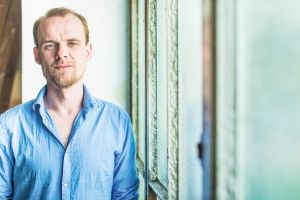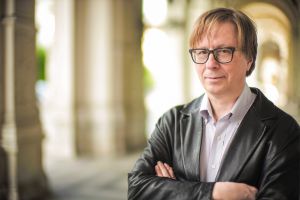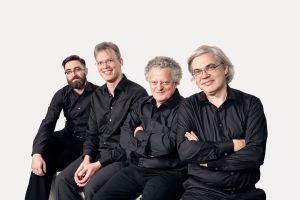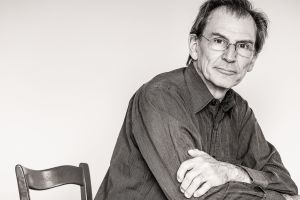“Mood” is the topic of this year’s Wien Modern festival, set to take place from 29 October to 29 November. And as in past years, several Wien Modern events are to be held in cooperation with the mdw.

Composer Peter Jakober’s project Seitenraum [Side Room] invites the audience to explore sound for themselves: on 4 November, 18 musicians from the mdw under the direction of Jamie Wolfson, who teaches at the Joseph Haydn Department of Chamber Music and Contemporary Music, will fill Palais Mollard with the sounds of Jakober’s compositions for strings. The musicians will all play to click tracks set at differing tempi in various positions throughout three interconnected rooms of this palace. In these rooms, their audible realisation of the various tempi will give rise to various moods. And the audience, free to wander between the rooms and musicians with the option of taking a seat here or there, will experience the resulting sounds in highly individual ways. “The listeners, by doing what they do, will create their own compositions,” says Peter Jakober. In Jakober’s composing, space is an important theme. Moving within spaces creates opportunities to hear sounds from up close and afar as well as to focus on sounds individually. And in this work, Jakober plays with diverse approaches to realising sound in order to allow the audience to experience its central elements from up close and far off as well as to allow the simultaneity of sonic processes to be experienced. “This gives rise to both sonic communication and countermovement between the spaces, manifesting intriguing sonic states within which the audience moves around freely,” explains Jakober.
A further highly effective experience-in-sound awaits the festival audience at the mdw on 14 November. The mdw’s Webern Ensemble, led by contemporary music professor Jean-Bernard Matter of the Joseph Haydn Department, will be devoting itself to three creators of “musique spectrale”, a musical style that arose in France during the mid-1970s.

Finnish composer Kaija Saariaho’s work Nymphéa (in the version for string quartet and electronics) will begin this concert. “Saariaho likes to work with contrasts, with a mixture of noise and pleasingly lyrical music and electronics. Her music has a certain tranquillity to it and is very poetic,” says Jean-Bernard Matter. The piece by the well-known Austrian spectralist Georg Friedrich Haas, Wer, wenn ich schriee, hörte mich… for percussion and ensemble, is the second work on the programme. For percussionists, one of the challenges here is constructing their own instruments from all kinds of objects—like pieces of metal, car springs, and similar.

“A major aspect of contemporary music is that a lot of things are left to the musicians themselves, who are forced to improvise—though it’s also the case that some parts of such compositions are very exact,” explains Matter. Haas wrote this work during a 1999 stay in Croatia, where the presence of war was signalled quite audibly by fighter jets flying overhead. “This is an emotional and mysterious work with many different elements and an open conclusion,” Matter remarks. The programme will conclude with British composer Jonathan Harvey’s Bhakti for 15 musicians and quadraphonic tape. “This is a cult piece, one of his masterpieces. The interplay of the musicians and live electronics makes for an introverted and touching work,” Matter says. With this selection of composers and the varied formats and forces, listeners can expect a challenging evening that includes music seldom heard in Austria.
The Arditti Quartet is a Wien Modern regular, and this year will also see them welcomed at the mdw. Violinist Irvine Arditti founded this world famous ensemble in 1974, and they’ve since become quite renowned for their interpretations of 20th- and 21st-century works.

At the mdw, the Arditti Quartet will bring their skill and experience to bear from 2 to 3 November in public master classes for string quartets plus a concluding concert. And as an additional offering, a University-internal call has been put out for composing students to submit their pieces and receive the Arditti Quartet’s feedback. The quartet’s members view close exchange with composers as a significant basis for modern music’s interpretation, for which reason they make an effort to do so frequently as part of their work.

Ten compositions for solo piano in 10 different tunings: this is what awaits the festival audience in a large-scale piano cycle by Edu Haubensak that will be performed at the Vienna Konzerthaus on 31 October with mdw students participating. In his works, Haubensak—a Helsinki-born composer who now lives in Zurich—explores the possibilities of scordatura (non-standard tunings). His initial composing for solo piano with atypical turnings eventually culminated in the several-hour piano cycle Grosse Stimmung I−X. “Though at first hesitant and without the intent to produce a large-scale cycle, I was gradually drawn farther and farther into it as I discovered unexpected ways to explore altered tunings on the piano. The variants are near-inexhaustible, since we have 241 strings that can be individually tuned,” explains Edu Haubensak.
As a central theme, “mood”—the German word for which, Stimmung, also denotes tuning—offers the Wien Modern audience members latitude for their own inferences and promises an interesting programme in which the mdw, through its teachers and students, will be centrally and quite atmospherically involved. Details on the above-mentioned events can be found at wienmodern.at.

